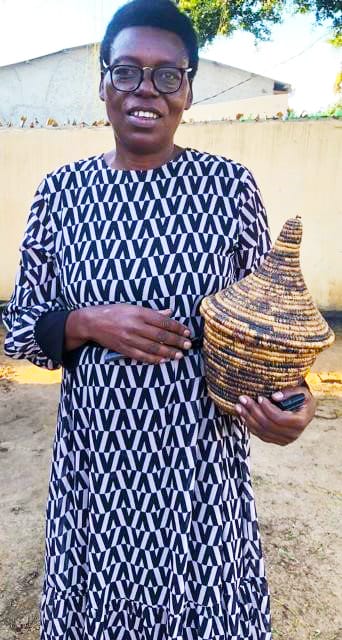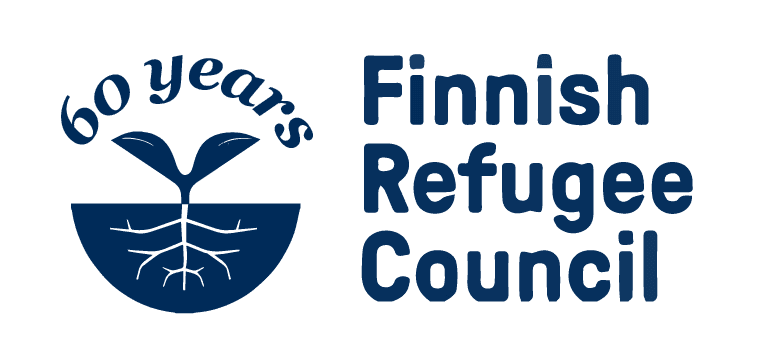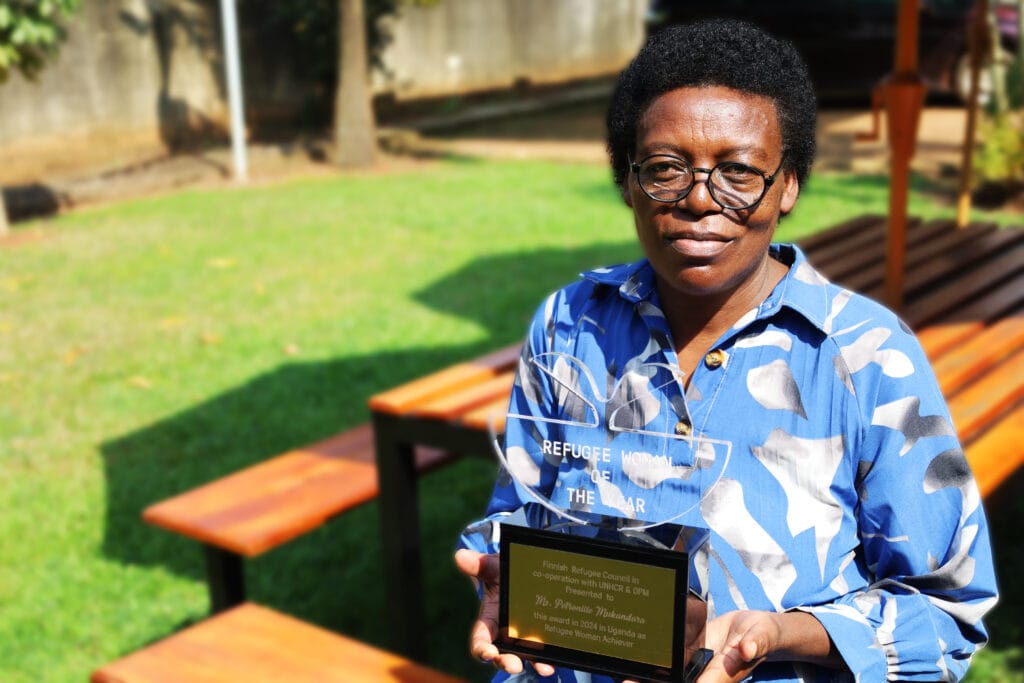In 2024, Finnish Refugee Council’s country office in Uganda named Petronille Mukandora the Refugee Woman of the Year. The Refugee Woman of the Year award is a recognition that highlights the resilience, leadership, and positive change that refugee women bring to their communities. A year after receiving the award, Petronille is working to support children with disabilities and their mothers, developing handicraft production, and promoting education and awareness about disability in her community.
Petronille Mukandora fled the conflict in her home country of Rwanda and arrived in Uganda with her three children in 2019. As a single mother and parent of a child with a disability, Petronille wanted to create a safe space for women where everyone could share their fears and frustrations. She was therefore involved in founding an initiative called Wenzetu, which five years later continues to empower mothers of children with disabilities through vocational training and advocacy.
A year after receiving the recognition, we met with Petronille to hear how her life has changed and what advice she would give to other refugee women to help them find their voices and strength in the face of adversity.
Last year, you were awarded the Refugee Woman of the Year. How did it feel when you found out you had won?
”“When I received the call from FRC’s office in Kampala informing me that I had won the Refugee Woman of the Year award, I was at home with my children. When I shared the news with them, the whole family was thrilled for me. We knelt together and thanked God for the wonderful news. My children were happy about the award because they felt that they had a mother who could make things happen. They even jokingly started asking me to take them to America. I was so happy. I felt that my efforts were seen and recognized.
I sincerely want to thank FRC and the Government of Uganda for welcoming me as a refugee and giving me the opportunity to live freely and do meaningful work.
I also thank UNHCR for coordinating efforts with partners like FRC. May God bless them all.”
Did winning the award change your life in any way?
“Yes, it did. When I returned from Kampala with the award, I first told my supervisor at the Wenzetu organization, which we founded to support mothers of children with disabilities. I also informed the staff of TPO (Transcultural Psychosocial Organization), which supports our work.
After receiving the award, we’ve been able to include more mothers and some children with disabilities in our handicraft training. We even opened a new center in the village of Kabazana so that women from the area wouldn’t have to travel to our original center in Base Camp. This has enabled more mothers to participate in our activities and start producing handicrafts after learning the necessary skills.”
What have you worked on or achieved since receiving the award?
“Since receiving the award, I’ve focused on increasing the number of mothers of children with disabilities and, in some cases, the children themselves participating in our activities. We opened a second Wenzetu center in Kabazana village so that mothers in that area wouldn’t need to come to our main center located in another settlement. The new center has increased the production of handicrafts, as participants begin making products once they learn the required skills.
At the same time, I’ve continued raising awareness about children with disabilities, women’s involvement in family development, child protection, and women’s income-generating activities.
When I returned home with the award, I asked the FRC’s Nakivale team to organize an English course. They agreed and gave us the opportunity to learn English through adult education. Members of my group are now studying English so we can improve our communication within and beyond the refugee settlement. We have English classes on Mondays, Tuesdays, and Thursdays, and we are very grateful to FRC for that.

We sell our handicraft products at markets in places like Kityaza, Mbarara city, and New Congo. I also sell some items online through platforms like WhatsApp, Instagram, LinkedIn, Snapchat, and others. The money we earn is placed in a savings group that allows us to issue loans with the support of OMIPA SACCO.”
Have you faced any new challenges or obstacles over the past year?
“Yes, one challenge is the lack of customers. Online sales are also not easy because some customers stop the transaction after hearing the prices. Another challenge is the lack and high cost of raw materials for producing the handicrafts, as they must be purchased from Mbarara city.
I use our savings group to take out loans, which helps us operate even when there are no customers. To ensure sustainability and diversification, we also have gardens where we grow vegetables. By selling vegetables, we support our group and also provide balanced meals for children with disabilities.”
What message or advice would you like to give other refugee women who might feel invisible or powerless?
“My advice to them is not to focus too much on the help they receive from partners or UN organizations. Instead, they should build their own brand, work hard, save money, and start earning their own income.
Regarding support for children with disabilities, I want to say that families with disabled children should keep speaking out and fighting for their own rights and the rights of their children.”
Read more about FRC’s work in Uganda on “Our Work” page.


